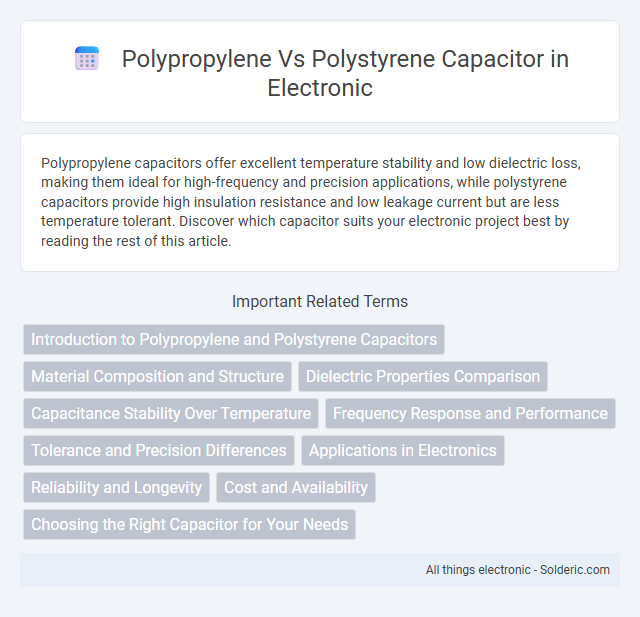Polypropylene capacitors offer excellent temperature stability and low dielectric loss, making them ideal for high-frequency and precision applications, while polystyrene capacitors provide high insulation resistance and low leakage current but are less temperature tolerant. Discover which capacitor suits your electronic project best by reading the rest of this article.
Comparison Table
| Feature | Polypropylene Capacitor | Polystyrene Capacitor |
|---|---|---|
| Dielectric Material | Polypropylene (PP) | Polystyrene (PS) |
| Capacitance Range | 1 pF to several uF | 1 pF to 1 uF |
| Tolerance | +-1% to +-5% | +-1% to +-2% |
| Temperature Stability | Excellent (-55degC to 105degC) | Very good (-55degC to 85degC) |
| Dielectric Loss (DF) | Low (0.0002 to 0.0005) | Very low (0.0001 to 0.0004) |
| Frequency Range | Up to 100 kHz to MHz | Up to 1 MHz |
| Voltage Rating | Up to 630 V | Up to 300 V |
| Moisture Sensitivity | Moderate | Low (better moisture resistance) |
| Applications | Precision filtering, audio, timing circuits | Precision timing, RF circuits |
| Cost | Moderate | Higher |
Introduction to Polypropylene and Polystyrene Capacitors
Polypropylene and polystyrene capacitors are widely used in electronic circuits due to their distinct dielectric properties and performance characteristics. Polypropylene capacitors offer low dissipation factor, high insulation resistance, and excellent stability over a wide temperature range, making them ideal for precision applications and audio circuits. Polystyrene capacitors feature low dielectric absorption and good dimensional stability, which benefits timing circuits and filters, though they are limited by a narrower operating temperature range compared to polypropylene.
Material Composition and Structure
Polypropylene capacitors use a dielectric made from a polymer with long hydrocarbon chains, providing low dielectric loss and high insulation resistance. Polystyrene capacitors feature a rigid, glassy polymer dielectric that offers excellent dimensional stability and low dissipation factor. Your choice impacts performance based on the capacitor's material structure and how it influences electrical properties like capacitance stability and temperature tolerance.
Dielectric Properties Comparison
Polypropylene capacitors exhibit superior dielectric properties, including low dielectric loss and high insulation resistance, making them ideal for high-frequency applications and precision circuits. Polystyrene capacitors offer excellent dielectric stability and low dissipation factor but have a lower temperature tolerance compared to polypropylene. Your choice between polypropylene and polystyrene capacitors should consider the specific dielectric constant, temperature range, and loss characteristics required by your electronic design.
Capacitance Stability Over Temperature
Polypropylene capacitors exhibit superior capacitance stability over a wide temperature range, typically from -55degC to 105degC, maintaining minimal changes in capacitance values due to their low dielectric absorption and low dissipation factor. Polystyrene capacitors, while offering excellent stability at room temperature, have a more limited operational temperature range, usually up to 85degC, and experience greater capacitance variation with temperature changes. This makes polypropylene capacitors ideal for applications requiring consistent performance under varying thermal conditions.
Frequency Response and Performance
Polypropylene capacitors exhibit superior frequency response and low dissipation factor, making them ideal for high-frequency and precision applications. Polystyrene capacitors provide excellent stability and low dielectric absorption but have a narrower frequency range and higher losses compared to polypropylene. You should choose polypropylene capacitors when consistent performance across a broad frequency spectrum is essential.
Tolerance and Precision Differences
Polypropylene capacitors exhibit tighter tolerance levels, often within +-5% to +-10%, making them ideal for precision applications requiring stable capacitance over varying temperatures. Polystyrene capacitors typically offer even narrower tolerance, as low as +-2%, enhancing accuracy but with limited temperature range and reduced mechanical flexibility. Both types favor stability, yet polystyrene excels in precision, while polypropylene provides broader environmental durability.
Applications in Electronics
Polypropylene capacitors are widely used in high-frequency and precision electronic circuits due to their low dielectric loss and excellent stability, making them ideal for audio, RF, and signal processing applications. Polystyrene capacitors offer superior insulation resistance and low leakage current, which makes them suitable for use in timing circuits, filters, and sample-and-hold circuits in analog electronics. The choice between these capacitors depends on specific electronic requirements such as temperature stability, frequency response, and capacitance tolerance.
Reliability and Longevity
Polypropylene capacitors exhibit superior reliability and longevity due to their low dielectric absorption and high insulation resistance, resulting in stable performance over extended periods and under varying temperature conditions. Polystyrene capacitors, while offering excellent electrical characteristics and low loss, tend to have a shorter lifespan and reduced thermal stability, which can compromise their reliability in demanding applications. The inherent robustness of polypropylene film materials ensures sustained capacitance and minimal degradation, making them preferable for long-term, high-reliability electronic circuits.
Cost and Availability
Polypropylene capacitors typically have higher costs compared to polystyrene capacitors due to their better thermal stability and lower dielectric loss, making them preferred in high-performance applications. Polystyrene capacitors, while less expensive and widely available, are becoming harder to source as manufacturers phase them out in favor of more reliable alternatives. Your choice depends on balancing budget constraints with the required electrical characteristics and supply considerations.
Choosing the Right Capacitor for Your Needs
Polypropylene capacitors offer superior stability, low dielectric loss, and excellent temperature resistance, making them ideal for precision applications requiring long-term reliability. Polystyrene capacitors provide high insulation resistance and low conductivity but are limited by a narrower temperature range and higher sensitivity to aging. Selecting the right capacitor depends on operating conditions, frequency response, and environmental factors to ensure optimal performance and durability.
Polypropylene vs polystyrene capacitor Infographic

 solderic.com
solderic.com